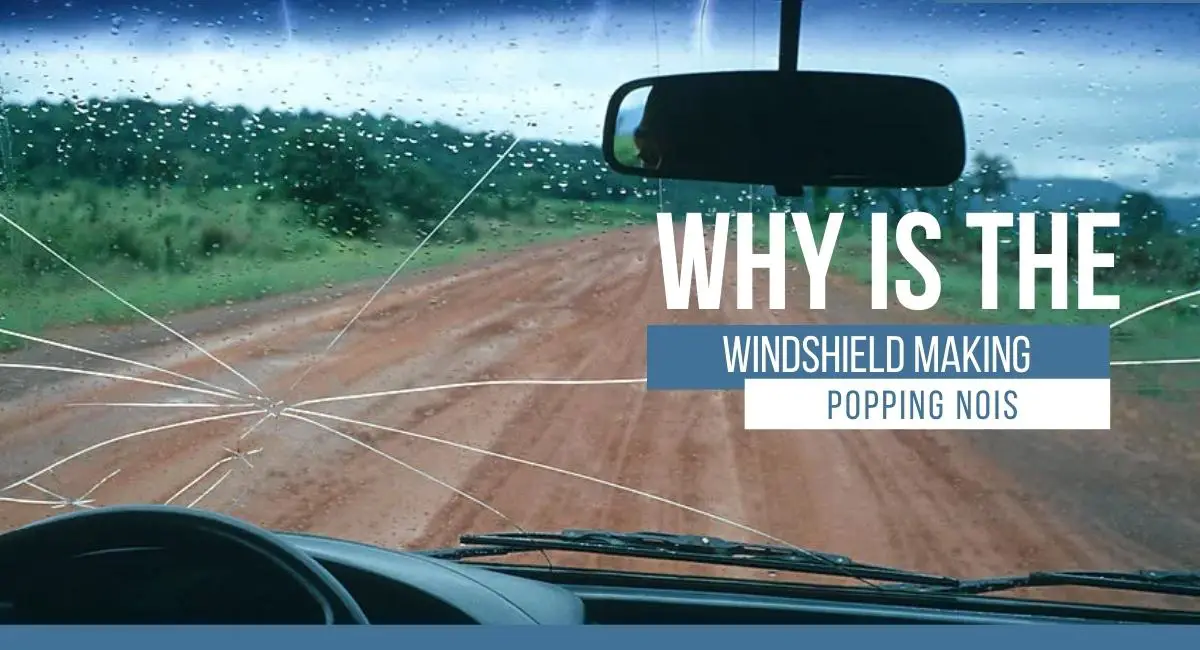As you cruise down the road, enjoying the freedom of the open air, you suddenly hear an unexpected sound that startles you—a distinct popping noise from your windshield.
Is it a sign of imminent danger? Your windshield is not just a piece of glass—it provides structural support and protects you from external elements.
Popping noises from your windshield can range from subtle and occasional to loud and persistent, and various factors can trigger them. Temperature changes, manufacturing defects, impact or damage, and external environmental conditions contribute to the unsettling sounds emanating from your windshield.
In this article, we will delve into the various reasons windshields make popping noises, their effects, and the preventive measures you can take to ensure your safety and the longevity of your windshield.
Causes of Windshield Popping Noise
Several factors contribute to the occurrence of these enigmatic noises. Temperature changes, manufacturing defects, impact or damage, and environmental factors all disrupt the tranquility of your windshield. By examining these causes, we will uncover the underlying reasons behind your windshield making crackling noise.

Temperature Changes
One of the primary culprits behind new windshields making crackling noise is temperature fluctuations. Your windshield is composed of two distinct layers: the inner layer, which is made of laminated glass and is thicker, and the outer layer, which is made of tempered glass and is thinner. These two layers have different characteristics when it comes to expanding and contracting in response to temperature fluctuations.
When exposed to extreme temperatures, such as when your car is in direct sunlight, the outside temperature rises higher than the temperature inside the vehicle, and the outer layer of the windshield expands while the inner layer contracts.
This disparity in the expansion and contraction rates creates uneven stress within the glass, leading to varying degrees of expansion and contraction in different areas. Consequently, this can result in the glass making popping noises as it adjusts to the thermal changes.
Manufacturing Defects
Improper installation of windshields or faulty adhesive or sealants during the installation process can also result in popping noises. If the windshield is not correctly aligned and securely attached to the vehicle’s frame, it can vibrate or shift slightly, causing popping sounds. Similarly, low-quality adhesive or sealant may not provide adequate bonding, leading to movement and noise.
Impact or Damage
Damage to the windshield, such as stone chips or cracks, can weaken its structural integrity. Over time, these weak spots can cause popping noises, especially when exposed to vibrations from rough road conditions or sudden impacts. Additionally, residual structural weaknesses may contribute to the popping sounds if the windshield has undergone previous repairs or replacements.
Worn out Windshield Wipers
Worn-out windshield wipers can be a surprising culprit behind popping noises experienced while driving. Windshield wipers play a crucial role in maintaining clear visibility during rainy or snowy conditions by removing water, snow, and debris from the windshield.
Over time, however, the rubber blades of the wipers can deteriorate and lose their effectiveness. When the wiper blades on your vehicle become worn out, they can create an uneven pressure distribution as they move across the glass surface. This uneven pressure can result in a distinct popping sound when the wiper blades come into contact with the glass.
Leaves and Twigs lodged in Crevices and Gaps
When leaves and twigs get lodged in the various crevices and gaps of a windshield, they can create an audible popping sound due to air pressure buildup and the trapped debris’s movement. This phenomenon is particularly noticeable when driving at high speeds or in windy conditions. If you hear popping noises from your windshield but cannot immediately identify any visible debris, it is wise to investigate the issue promptly.
Environmental Factors
External environmental factors can contribute to windshield popping noises. Vibrations from bumpy roads, uneven surfaces, or passing heavy vehicles can cause your new windshield to crackle. These vibrations, coupled with the inherent flexibility of the glass, can generate popping noises. Atmospheric pressure can exert force on the windshield, leading to flexing and noise.
Effects of Windshield Popping Noise
The effects of a new windshield making crackling noise can extend beyond mere auditory annoyance. They can have various implications for the driver and the vehicle’s safety. Let’s delve into the potential consequences of these unsettling sounds:
Distraction and Discomfort
The popping noises from your windshield can be highly distracting and uncomfortable, both for the driver and the passengers. They can disrupt concentration, making it difficult to focus on the road ahead and potentially increasing the risk of accidents. Moreover, constant popping noises can cause irritation, stress, and fatigue during long drives, impacting your overall driving experience.
Potential for Further Damage or Failure
Ignoring windshield popping noise can have severe consequences. What may initially start as a minor noise can escalate into more significant issues! Vibration and movements can exacerbate existing cracks or chips, leading to further damage.
Safety Concerns
The integrity of your windshield is crucial for your safety on the road. A compromised windshield can hinder your visibility, impairing your ability to see and react to potential hazards. Additionally, in the event of a collision or rollover, a weakened windshield may fail to provide adequate support, increasing the risk of injuries.
Preventive Measures
Taking preventive measures can significantly reduce windshield popping noises and help maintain the integrity of your vehicle’s glass. Here are some preventive steps you can follow:
Regular Maintenance and Inspection
It is essential to conduct regular maintenance and inspections to prevent windshield popping noise. Check for any signs of damage, such as cracks or chips, and address them promptly. By catching and repairing minor issues early on, you can prevent them from escalating into more significant problems.
Timely Repair of Windshield Damage
Address any chips, cracks, or damage to your windshield promptly. Small chunks can quickly escalate into larger cracks, leading to potential popping noises. Repairing minor damage early on can prevent further deterioration and the need for a complete windshield replacement.
Use Proper Wiper Blades
Ensure you have the right type and size of wiper blades for your vehicle. Worn-out or incorrect wiper blades can cause uneven pressure distribution and result in popping noises. Regularly inspect and replace the wiper blades as needed to maintain optimal performance.
Choosing High-Quality Windshields and Proper Installation
When replacing your windshield, opt for high-quality glass and ensure.
Important Read: How to Clean Lexus Nuluxe Seats: A Comprehensive Guide
It meets industry standards. Additionally, choose reputable auto glass professionals for installation, as their expertise and adherence to proper installation techniques can minimize the risk of popping noises.
Protection Against Temperature Changes
To mitigate the effects of temperature fluctuations and reduce direct exposure to sunlight, consider parking your vehicle in shaded areas or utilizing sunshades. Avoid sudden temperature changes whenever possible, as gradual transitions are less likely to cause stress on the windshield.
Drive Cautiously on Rough Roads
Vibrations from bumpy roads or uneven surfaces can contribute to windshield popping noises. When driving on rough terrain, reduce the impact by slowing down and driving cautiously. Additionally, avoid potholes and speed bumps whenever possible to minimize the vibrations transmitted to the windshield.
Steps to Address Windshield Popping Noise
When faced with popping noises emanating from your windshield, it is crucial to take swift action to address the issue. Here are the steps you can follow to resolve the problem effectively:
Consultation with Professionals
To accurately diagnose the cause of the popping noises and determine the appropriate course of action, it is advisable to consult with a professional windshield repair or replacement service. These experts have the knowledge and experience to identify the underlying issue and provide tailored solutions. Schedule an appointment with a reputable auto glass specialist to thoroughly inspect your windshield.
Thorough Inspection
During the inspection, the professionals will carefully examine your windshield for any visible damage, alignment issues, or manufacturing defects. They may employ specialized tools and techniques to assess the overall state of the glass and identify the source of the popping noises. The inspection determines whether the issue can be resolved through repairs or if windshield replacement is necessary.
Repair or Replacement
Based on the inspection findings, the professionals recommend repairing or replacing the windshield. If the damage is minimal, it may be possible to repair them using specialized techniques.
Proper Installation and Sealants
Ensuring correct windshield installation using high-quality adhesive or sealants is crucial during the repair or replacement process. The professionals will use precise techniques to align and secure the glass to the vehicle’s frame, ensuring a tight and secure fit. Using proper installation methods and quality sealants minimizes the risk of future popping noises and enhances the overall durability of the windshield.
Ongoing Maintenance
Once the windshield has been repaired or replaced, it is essential to maintain regular upkeep to prevent future issues. Follow the maintenance recommendations provided by the professionals, which may include periodic inspections, cleaning, and avoiding harsh chemicals or abrasive materials that could damage the glass. By staying vigilant and promptly addressing any signs of damage, you can prolong the lifespan of your windshield and minimize the likelihood of recurring popping noises.
Conclusion
Your windshield is vital to your vehicle’s safety, and you should not take any unusual noises lightly. Popping noises can stem from various causes, including temperature changes, manufacturing defects, impact or damage, and environmental factors. It is crucial to address these issues promptly to prevent further damage, ensure your safety, and maintain the longevity of your windshield.
